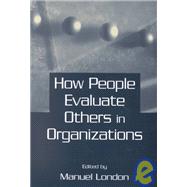How People Evaluate Others in Organizations
, by London, Manuel- ISBN: 9780805836127 | 0805836128
- Cover: Paperback
- Copyright: 4/1/2001
Evaluating and making decisions about other people are key aspects of doing business, especially for managers and human resource professionals. Industrial and organizational psychologists devise systematic methods to remove human errors in judgment, such as biases and stereotypes. However many decisions about people are not made by experts using standard procedures. Even when they are, human judgment is unavoidable. This book examines the social psychological dynamics of person perception that underlie how people evaluate others in organizations. It contains original articles from leading experts in social, industrial, and organizational psychology. The book begins by examining basic principles and processes of social cognition and person perception, such as schemas, stereotypes, automatic/mindless information processing, the perceiver's motivation and affect, and situational conditions. It then applies these ideas to key areas of business operations. Helping readers understand and develop ways to improve the way people assess and make decisions about others, this book: * covers the interview, executive promotion decisions, and assessment centers; * examines performance appraisals and multisource (360 degree) feedback ratings; * addresses leadership cognitions, identifying training needs, coaching, and managing problem employees; and * includes chapters on cultural sensitivity, negotiations, group dynamics, and virtual teams.







